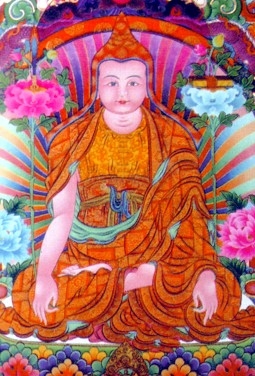Seven Treasuries: Difference between revisions
Jump to navigation
Jump to search
m (Seven Treasures moved to Seven Treasuries over redirect) |
No edit summary |
||
| Line 20: | Line 20: | ||
[[Category: Texts]] | [[Category: Texts]] | ||
[[Category:Enumerations]] | [[Category:Enumerations]] | ||
[[Category:Seven | [[Category:Seven Treasuries]] | ||
Revision as of 08:07, 4 August 2007

The Seven Treasures or Treasuries are works by the omniscient Longchenpa which, together with the Trilogy of Natural Freedom, represent the extensive, scholarly or pandita's approach. They were not originally intended to be a collection.
- The Wish Fulfilling Treasure (Tib. yishyin dzö - yid bzhin mdzod)
- The Treasury of Pith Instructions (Tib. mengak dzö - man ngag mdzod)
- The Treasure of Dharmadhatu (Tib. chöying dzö - chos dbyings mdzod)
- The Treasure of Philosophical Tenets (Tib. drubta dzö - grub mtha' mdzod)
- The Treasure of the Supreme Vehicle (Tib. tekchok dzö - theg mchog mdzod)
- The Treasure of Word and Meaning (Tib. tsik dön dzö - tshig don mdzod)
- The Treasure of the Natural State (Tib. neluk dzö - gnas lugs mdzod)
History


According to oral tradition of villagers in Bumthang / Bhutan, the some of the most important parts of of the Seven Treasures have been written by Longchenpa on the rock bzhugs thri above the Tharpaling Monastery in Bhutan.
This rock provides a splendid panorama view on different mountain ranges of the Himalayas: